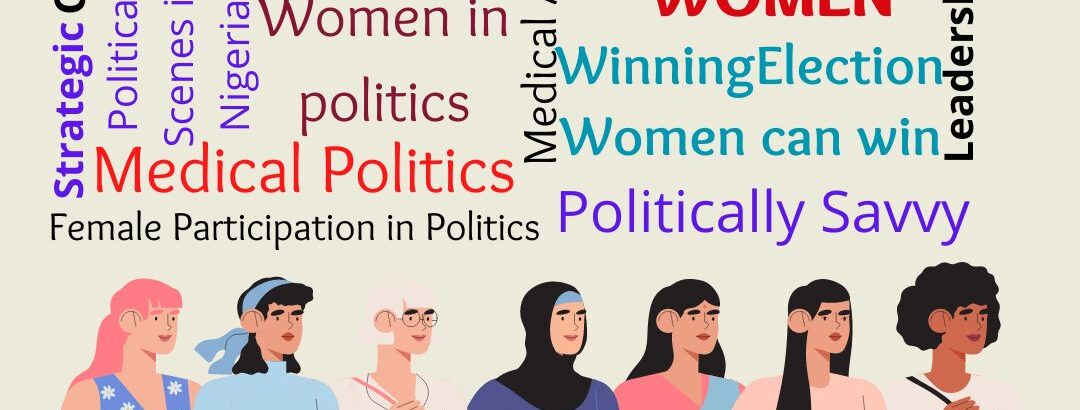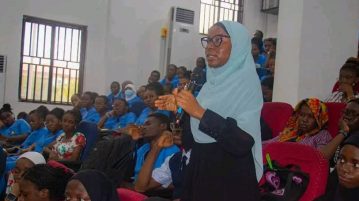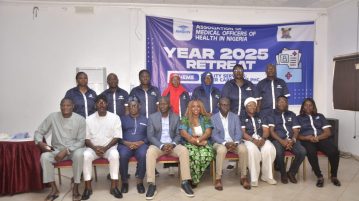Earlier this year, another NMA National election took place, and on the 15th of May 2024, the newly elected members of the National Officers Committee (NOC) held their inaugural meeting. As usual, no woman made it to the key decision-making positions on the officers’ committee, as all the officers on the executive list were men.
Year in year out, since inception till date, women have been – and still are – abysmally represented on the executive councils of many medical associations e.g. NMA, NARD, NiMSA and the likes. Despite making up half of the general population and about 70% of the medical and health care providers’ population.
Fun fact: The last female on the NMA National Officers’ Committee (NOC) Members was elected in the 1980’s. That is, Dr. Chief (Mrs) T. A. Abiola Oshodi, who was NMA National president between 1988–1990. Up till date, no female has been elected to the national secretary position, despite having a well-qualified candidate (Dr Carol Iwuoha of NMA Abia) contest for the position in 2022.
These outcomes could be traced to some issues identified over time, which include making the medical-political space unconducive for women, stifling off the few women that dare to stand against male opponents for positions, and playing tactical and/or divisive politicking. Largely, this involves calculated strategies, controlled alignments and proactive participation, rather than having the mere desire or qualification for contesting for these posts or supporting gender balance on those platforms. Sadly, females are often disadvantaged in these areas because of the closed or delegate types of voting systems we use across these associations.
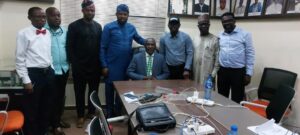
This was also affirmed by female participants at the level of politics among medical students, who after a national election with a female candidate, reiterated that “politics is politics”. Further explaining that sometimes women don’t win these elections not because they are unqualified or unsupported, but simply because “politics is politics”, and you just have to play the number cards well. In which most women are or might be lacking, because this requires a lot of rigorous politicking and “poli-tricking”.
According to an active male participant in the NiMSA and student political space during the 2010’s, he revealed that “honestly, I think women have been contesting in NiMSA since the 90’s, but we don’t have good record keeping culture and passing down our history judiciously. Because during a discussion with one of my professors on the political vibrancy and involvement of students, young people and females, he spoke about a lady who contested as one of the NiMSA presidency candidates from the Southwest region. Plus, she was a president of her school’s medical students’ association (MSA) at the time.”
Fun fact: Over the past decade (2013 – 2023), NiMSA has had only 3 female presidential candidates – Winifred Erepade Esite from Niger Delta University, Bayelsa State (contested in 2016), Ehi Ekoja from University of Jos (contested in 2022), Victoria Nsikakabasi Graham from University of Uyo (contested in 2023).
Historically, women are disenfranchised in the mainstream politics in Nigeria, having more men in office and NMA is no different, with the same challenges plaguing women running for office in any circumstance and at any time in the nation. Another identified challenge that faces women, making them drop out of political races, can be linked to the peculiarity of the country – where people can choose oppression or wield external forces to push a person out of politics. Hence, forcing or leaving the women with the only option of choosing their safety and peace of mind, over political ambition, position and power.
To tackle these identified challenges, some are of the opinion that certain positions be zoned to women, for inclusion and ease of participation. However, in response to this, it was highlighted that zoning a role to a gender in politics, could be limiting. Citing an example that, if the Vice President position is zoned to women but a woman wants to run for presidency, an argument can ensue that the role is not opened to women. Furthermore, others countered this submission on zoning roles by gender, stating that many women around the globe have contested for highly exalted positions and/or political office in the presence of strong men and such women have come out victorious.
Fun fact: In different NMA state branch, the first and only female chairman in NMA Lagos was inaugurated in 1968 and only in 2022 did NMA Lagos produce her first secretary. While NARD had their first female secretary in 2018 and till date (since inception in 1978), has not produced a female president.
These strong women fought hard in the same supposedly oppressive and toxic environment and won elections even at national level. Therefore, if those women can do it in National Politics, then our women should be able to do it in NMA, NiMSA and other medical political spaces, rather than been discouraged from achieving whatever they want to achieve. With the admonition that, what makes us stronger is the believe in ourselves, that – as women – we can achieve whatever it is we want to achieve in life. And that we have the ability to weather the storms of life, regardless of the difficult challenges or threat posed at us.
Nevertheless, a commonly agreed upon submission, was to place emphasis on ensuring fairness and not ousting anyone from political races. Because if a woman wins an election fair and square, it would be a more glorious win than a win from a contest in a role that had already been zoned to only women. For instance, a female doctor commented, “Although it might take time, but I’d rather have a female NMA president who campaigned and won based on merits, than a 1st Vice President who won because the only other contestants for her role were women”.
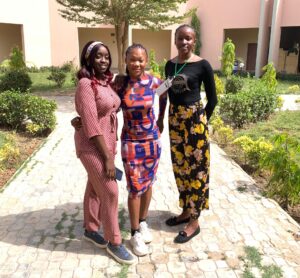
Another controversial disposition was the idea of supporting a female candidate for a political position, simply because she is woman. While some argued that isn’t “gender equality” in any form, others are of the stance that, mostly, the only reason women aren’t voted into positions has nothing to do with their capacity but simply because they’re women. Thereby cross-questioning that, “why then can’t we vote for a woman just because she’s a woman?”. Additionally affirming that her performance won’t be worse than what we’ve had from male politicians for years, so we can give her some chance. However, giving stern warnings about women who get into power and don’t stand for other women, but will throw their fellow women “under the bus” for male validation. An example of a certain minister for women affairs was cited, on how she is actively fighting against women and their rights in her country.
Hence, a unanimous stand was not just to have women in power, but the need to have “feminist” in power, and to always support qualified women into better and higher positions. As these would definitely help and make a difference for us all.
A fair playing ground for all removes oppression and threats. Letting people contest and win based on their abilities, efforts and the amount of support they are able to garner.
Also to address the issue of the closed or delegate types of voting systems used across these medical political associations, a submission was the possibility and hope for a “One Doctor, One Vote” system, which is also believed would aid open participation and let individuals contest, campaign and vote fairly.
Another cogent issue affecting women in the political space, is the unrealistic expectation of perfection from these women in leadership positions. Because even when she’s “perfect”, she still wouldn’t get all the support needed just because she is female. And women who do end up winning “non-women” positions have to show an exceptional level of competence, politicking and influence – that is never enough. As in the real sense of things, they still have to “get in bed” – figuratively but without judgement, could be literal in some extreme cases – with men to garner support.
For the sake of individuality, equality and equity for female participation in politics, let us try to get involved starting from the grassroot levels (MSA’s for NiMSA, State branches for NMA and NARD). Also, we must stay involved, by contesting for roles and winning seats for ourselves or helping others to win. We must make it a habit to attend meetings and be known in our regions. Finally, let’s learn to negotiate well, demand more and never settle for less.
Miracles don’t happen every day, we make it happen sometimes. Being realistic doesn’t break boundaries, being daring does…
Editor’s note:
This article was collated by Dr Mary O. Agoyi Awoniyi from the NiMSA Female Forum, NiMSA South-West Alumni, NMA Lagos Young Doctors Forum and MWAN Young Doctors Forum platforms following the outcomes from the NiMSA 2023 general election and the 2024 NMA National election.

